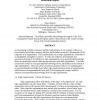289 search results - page 4 / 58 » A capabilities-based model for adaptive organizations |
GECCO
2004
Springer
15 years 5 months ago
2004
Springer
This study introduces the particle swarm metaphor to the domain of organizational adaptation. A simulation model (OrgSwarm) is constructed to examine the impact of strategic inerti...
GI
2004
Springer
15 years 5 months ago
2004
Springer
Abstract: The vision process is very complex and requires for its realization in artificial systems a fundamentally new technology for systems generation. This must be based on pr...
IMDS
2007
14 years 11 months ago
2007
As the graying workforce increases and the work patterns of our younger workers are more mobile, knowledge retention, attrition, and transfer become key determinants of the longev...
NAACL
2007
15 years 1 months ago
2007
We describe the use of meeting metadata, acquired using a computerized meeting organization and note-taking system, to improve automatic transcription of meetings. By applying a t...
SASO
2008
IEEE
15 years 6 months ago
2008
IEEE
In biology, many organisms coordinate their interactions in a self-organizing and emergent way solely by means of indirect communication based on chemical substances. These so-cal...

